| Srl | Item |
| 1 |
ID:
105121
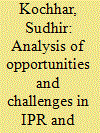

|
|
|
|
|
| Publication |
2011.
|
| Summary/Abstract |
This paper assimilates and contributes to the current state of IPR knowledge and proprietary products in the Indian jurisdiction. The influence of international IPR domain and influx of proprietary foreign technology products on Indian agricultural technology profile vis-à-vis the plight of the national players is discussed, particularly, with respect to patenting in plant biotechnology/transgenics. The factual scenario under the national PPV&FR regime is narrated. This paper also analyses the recent foreign interests in respect of patenting in the areas of animal vaccines and diagnostics vis-à-vis the existing strength of the national system, which needs to be maintained.
|
|
|
|
|
|
|
|
|
|
|
|
|
|
|
|
| 2 |
ID:
187175
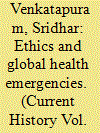

|
|
|
|
|
| Summary/Abstract |
The global response to the COVID-19 pandemic has been marred by a widespread failure to embed ethics in policymaking. The consequences have included vaccine hoarding by rich countries and the deaths of millions of people around the world. Governments have followed a simplistic narrative of science and finance teaming up against a virus and delivering a silver bullet in the form of a new vaccine, rather than recognizing that a health emergency reflects patterns of inequality within and across countries and other social factors that need to be addressed. Given the interconnection and interdependency of globalization, ethics must be incorporated in global health policy as a primary consideration, not an afterthought.
|
|
|
|
|
|
|
|
|
|
|
|
|
|
|
|
| 3 |
ID:
163176
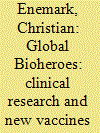

|
|
|
|
|
| Summary/Abstract |
In the pursuit of ‘global health security’, some governments advocate deployment of pharmaceuticals to combat deadly infectious diseases wherever they emerge. Following the Ebola outbreak in West Africa, attention has turned to other emerging diseases and future pharmaceutical solutions. There is growing support for enabling faster clinical research to make new vaccines available sooner. Research on experimental vaccines must ordinarily be consistent with ethical principles designed to protect human research participants. However, where a target disease is framed in security terms, it could be argued that an extraordinary response is required: exposing research participants to more risk in order to accelerate research and enable more lives to be saved pharmaceutically. This article assesses two scenarios of security-oriented research. The scenario envisaged by the Coalition for Epidemic Preparedness Innovations (CEPI) is the propelling of vaccine research through to the stage of human safety-testing before a natural outbreak of the relevant disease. Efficacy and effectiveness tests are then able to be conducted once an outbreak begins. In a hypothetical second scenario, pre-outbreak vaccine research undertaken for the sake of health security would also include efficacy-testing. This would involve the exposure to pathogenic microorganisms of healthy volunteers (‘global bioheroes’) from around the world
|
|
|
|
|
|
|
|
|
|
|
|
|
|
|
|
| 4 |
ID:
193027
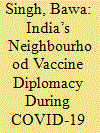

|
|
|
|
|
| Summary/Abstract |
In recent years, India has established itself as the world’s ‘pharmacy hub’, and this claim was proven once again when it delivered COVID-19 vaccines to its citizens, neighbouring nations and across the globe. Following the philosophy of humanitarianism through the principle of ‘Vasudhaiva Kutumbakam’, India has decided to provide the COVID-19 health assistance to its immediate neighbouring countries. India’s immediate neighbourhood refers to the countries that are geographically adjacent to it. In addition, India’s vaccine diplomacy has exposed geopolitical fault lines in South Asia as China’s vaccine diplomacy aims to outpace India in the region. Against this background, the main objective of this paper is to explain and examine India’s vaccine diplomacy as an instrument of its ‘Neighbourhood First’ policy during the COVID-19 pandemic. It argues that India’s health-focused approach has proved effective and aligned with its national interests. This review demonstrates that India’s health diplomacy has had an impact on medical and humanitarian assistance reciprocation at the regional and international levels. As a result of this strategy, during the second wave of the pandemic, India received medical devices and vaccines from other countries in dealing with COVID-19.
|
|
|
|
|
|
|
|
|
|
|
|
|
|
|
|
| 5 |
ID:
153145
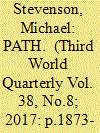

|
|
|
|
|
| Summary/Abstract |
Seattle-based PATH is one of the world’s largest not-for profit organisations focused on improving health in low-income countries. This article argues the history of this understudied organisation is critical to understanding how collective action focused on facilitating developing countries’ access to essential health technologies is structured. Since its establishment almost 40 years ago, the organisation has been a catalyst for multidisciplinary public–private collaboration that has produced affordable, culturally appropriate health technologies. From its origins in reproductive health, enabling contraceptive technology transfers and advising on regulatory standards, to its more recent managerial roles in the development of inexpensive vaccines produced in developing countries, PATH has repeatedly illustrated how public–private collaboration in product research and development can increase poor populations’ access to essential health technologies. This in turn has provided substance to the contested narrative that engaging business is critical to reducing global health disparities.
|
|
|
|
|
|
|
|
|
|
|
|
|
|
|
|
| 6 |
ID:
100068
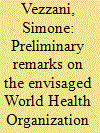

|
|
|
|
|
| Publication |
2010.
|
| Summary/Abstract |
Over the last few decades, the World Health Organization (WHO) has played a significant role in the prevention and control of new strains of influenza virus in the human population. Beginning in the 1950s, it has coordinated a network of WHO-linked laboratories, charged with monitoring the changes in influenza viruses and favouring the timely sharing of virus samples, which is necessary for the development and production of vaccines. In December 2006, the said system was brought into question by Indonesia, according to which it was unfair and in conflict with the principle of state sovereignty over biological and genetic resources. Although very controversial, the Indonesian decision to interrupt the supply of candidate influenza vaccine strains boosted intergovernmental negotiation, until then not achieved, aimed at establishing a new WHO framework. This article examines the outcome of such a negotiation, as well as the aspects of the framework still under discussion. It emphasizes the innovative nature of the proposed benefit-sharing mechanism, which would promote access to vaccines mainly through the multilateralization of intellectual property rights governance. Similarities and differences between the envisaged framework and the benefit-sharing mechanism established by the Food and Agricultural Organization International Treaty on Plant Genetic Resources for Food and Agriculture in the field of access to plant genetic resources are analysed.
|
|
|
|
|
|
|
|
|
|
|
|
|
|
|
|
| 7 |
ID:
187180


|
|
|
|
|
| Summary/Abstract |
Looking at the pandemic in the long historical view of “slow disasters” shows how it is a continuation of previous health emergencies rather than a discrete event. The tendency of politicians to prematurely declare an end to the pandemic has not helped improve public trust in health policy.
|
|
|
|
|
|
|
|
|
|
|
|
|
|
|
|
| 8 |
ID:
186783
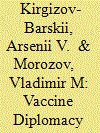

|
|
|
|
|
| Summary/Abstract |
With the COVID-19 pandemic in place for over two years now, it is
time to assess its main aspects and tendencies, and identify the new
features it has lent to the international relations landscape. This paper
studies two approaches different countries have taken in developing and
distributing COVID vaccines during the pandemic; these approaches are
defined as ‘vaccine diplomacy’ and ‘vaccine nationalism.’ Until recently,
vaccine diplomacy has played only a marginal role in international
relations, while vaccine nationalism has not been considered a problem
internationally.
|
|
|
|
|
|
|
|
|
|
|
|
|
|
|
|